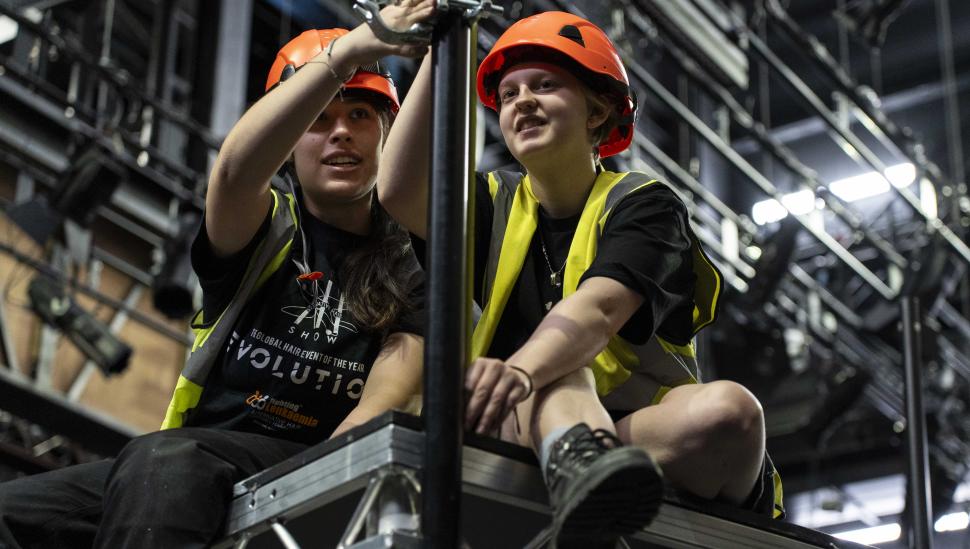BA (Hons) Production & Technical Arts: Stage & Screen


Three year course
Starting September 2026.
A practical and vocational course. Gain experience across a number of different departments in your first two years, before choosing a specialist focus in Year 3.

Highlights
Work in production roles on public shows from the first term onwards.
Undertake 11 production roles across the three years of the course.
Develop relevant practical skills and experience to be able to enter a production department within the creative industries.
Work with different members of LAMDA’s creative teams and learn how to research and deliver ideas.
Work with state-of-the-art technology.

Is this course for me?
Minimum age: 18
No academic requirement, but practical experience is necessary.
This course will prepare you for a career in theatre, film, television, live events and more.
Overview
Tuition fees
Tuition fees are reviewed annually.
2026/27 entry:
UK students: £9,525 per year
International students: £26,631 per year
Previous 2025/26 entry:
UK students: £9,275 per year
International students: £25,363 per year
Application deadline
1 July 2026 [3pm UK time]
Application fee
£27.50 UCAS fee (for 6 choices). There is no additional application fee for Production & Technical Arts courses.
Apply now
If you are a member of our Pathways Programme, you do not need to apply through UCAS.
About the course
On this industry-leading three-year course you’ll develop the skills, knowledge and experience you need to have a successful and long-lasting career in theatre, film, television and beyond.
This is a practical vocational course where you work on live productions from your first year onwards. Exploring the capabilities of LAMDA’s three professional theatre spaces and our range of workshop and studio facilities, you’ll work side-by-side with experienced industry professionals to create and run LAMDA’s productions.
You’ll gain experience across a number of departments, with the option to select your roles and specialise in a couple of key areas in the second and third years. You’ll learn stage management, scenic construction, lighting and sound, and there’s the option to work with the Screen & Digital Production team on LAMDA films in years two and three.
You’ll also work alongside industry professionals and final-year students from our BA and MFA Professional Acting courses to stage or film public productions throughout the three years of the course.
At the end of your comprehensive vocational training, you will be qualified to be the best in the industry: capable, creative and highly sought-after by employers.
In your first year of this technical theatre course, you’ll develop a firm grounding in production and technical arts. You’ll explore four core disciplines: stage management, scenic construction, lighting and sound, and you will be introduced to the elements involved in stage, screen and audio production.
Throughout the year, you’ll develop your management skills, learn prop making, health and safety, first aid, fire safety and AutoCAD and Vector Works.
You’ll also get to know the different roles within theatre, television and radio, and will quickly gain practical experience on LAMDA’s productions, working with other students to collaborate on innovative and creative work
In your second year, you’ll take it a step further as you undertake four senior production roles on LAMDA shows staged across our three performance spaces.
Senior roles will also be available on our screen productions, which are shot, recorded and edited by industry professionals. You can choose either to specialise in one area or keep your options open and work across a broader range of roles. The range of modules include options in Stage Management; Lighting; Production Sound; Scenic Construction; Production Management; LX Design; Sound Design; Screen & Digital Production.
You’ll also undertake a six-week placement. Your placement will give you the chance to put the skills you have learnt into practice in a professional environment. This will be an invaluable opportunity for you to expand on your skillset and make important industry contacts.
In your final year you will undertake three more senior production roles including at least one as Head of Department. You will have the opportunity to specialise in one department, though this is not essential and many students choose to work across different disciplines.
You will also undertake another period of work-based learning within the industry and do an Independent Project related to your preferred discipline as well as creating a Professional Portfolio.
Course timetabling and contact hours:
The course is extremely practical. You’ll be expected to train for a minimum of 35 hours per week of contact hours during the initial teaching period and then during busy production periods the weekly hours are likely to increase significantly
Teaching and Learning:
The course is designed to prepare you for the challenges of the industry, so you’ll be encouraged to build stamina, resilience, and a strong sense of commitment throughout your training.
Working in a collaborative environment means bringing consistent energy, focus, and a willingness to contribute meaningfully to rehearsals and group projects. It also involves being mindful of others’ creative processes. Showing up on time and being reliable are important parts of developing a professional mindset from day one.
Funding your training
The following scholarships are available for incoming Production & Technical students residing in the UK who meet eligibility criteria:
- The Andrew Lloyd Webber Foundation Scholarship is designed to support an incoming student with full tuition fees and an annual travel bursary for the duration of their course.
- The Leverhulme Arts Scholarships support students with partial living costs for the duration of their course.
- The Portal Trust Scholarship is designed to support an incoming student from the LAMDA Pathways Programme with a full bursary towards living costs for the duration of their course.
Find out more about how to fund your training and scholarships.
Key Information & FAQs
If you’re looking to explore the backstage professional world, and develop your expertise in stage management, technical theatre production and virtual production through in-depth training in technical and managerial competencies, this course is for you.
You’ll need to be a creative, independent minded individual with a passion for the dramatic arts, with a flexible, dedicated and hands-on approach to work.
The equipment list is reviewed annually and is subject to change for the next academic year. Ahead of beginning your course, you will receive more information about the equipment required.
Lockers, deposits and money
You will be allocated a locker for your three years, to keep your valuables safe.
A fee of £55.00 is required to cover various items that you will require during your training. Please bring the £55 with you on the first morning.
- £20 of this is a deposit for your swipe card and keys
- £5 of this money will cover the purchase of a USB Memory stick required in your training.
- £30 is to pay for your Personal Protection Equipment (PPE) which consists of a hard hat, hi-vis vest, earplugs, safety goggles and dust mask.
Assuming no loss or breakages, then £20 will be returned to when you leave the course. The USB Stick and PPE remain your property.
Equipment required
Work clothes while working in a production role on shows
- You will be required to wear 'Show Blacks' when working on productions.
- Tops must have long sleeves and be long enough to not reveal any skin when bending over.
- Trousers should not be faded, or ripped, but could be jeans, cargo trousers or similar.
- Black leggings are not appropriate, nor are v-neck tops.
- You will also require black shoes/trainers.
For set construction, painting, fit ups, get outs etc
- You must provide overalls or old clothes.
- Avoid clothing that is too loose and if you have long hair provide the means to tie it back.
Appropriate footwear
- Appropriate footwear must be worn during production periods and when working in hazardous environments for your own safety e.g. Workshop or onstage when building/striking.
- Ensure that you have a pair of black safety boots with a steel or composite toe-cap. It is vital to have good ankle support when selecting your steel toe-capped shoes, so boots are preferable.
- Details of other Personal Protective Clothing and equipment will be provided as required.
Tools and equipment
A tool and equipment list is provided below.
You must have all the items listed by the time you come to LAMDA. The kit list can seem quite daunting at first glance. Break it down, and start getting all the required items once you have accepted your offer from LAMDA.
These items represent only the basic ‘starter’ kit. A lot of students quickly discover that the basic list is very limiting, and many start to purchase a whole range of additional items in order to supplement the things we request; Leatherman multi-tools, cordless drills, laptop/computers etc.
The list below is a basic tool kit. If you wish to expand it further recommendations can be made. Please remember that your tools will be used intensively, therefore cheap tools can be a false economy. However, many shops offer reasonably priced starter toolkits that will contain many of the items listed, and represent excellent value if you are working to a tight budget.
Given that so many of you will be starting with identical kit, it is vital that you uniquely mark/label everything that belongs to you, either by etching, painting, colour coding with tape.
Stationary Equipment
- 1 x Wristwatch (Analogue, digital or smart)
- 1 x LED Torch or Head Torch
- 1 x Metric scale ruler (with 1:25, 1:50 & 1:100 scales)
- 2 x Pairs of Scissors (one for tough fabric and one for general purpose)
- Selection of pens and pencils (to include HB)
- Sharpies
- Highlighters
- Post-It Notes
Important note
On your first day you'll be required to show your tutors your toolkits in one of your classes. We will want to see your toolkits, work boots and any other equipment.
If you are struggling to obtain everything on the list – don’t panic! We will help you prioritise what to get next, when you arrive. Please note that LAMDA's insurance does not cover students' personal belongings, please source your own insurance for personal belongings.
There are no academic requirements for this course but you must demonstrate a determination to learn, and have some experience of working backstage on a production, whether that’s through school or in an amateur or professional production setting. Entrance to the course is determined via an interview.
You need to be a fluent English speaker. Non-native speakers do not need to provide an English language test report when they apply as we assess English at the auditions and interviews. However, you’ll need to provide a valid IELTS test report with an overall score of seven if you’re offered a place.
We can only accept IELTS for UKVI.
Tuition fees
Fees are reviewed annually.
2026/27 entry:
UK students: £9,275 per year
International students: £26,631 per year
Previous 2025/26 entry:
UK students: £9,275 per year
International students: £25,363 per year
Application fee
£27.50 UCAS fee (for 6 choices). There is no additional application fee for Production & Technical Arts courses.
If you are a member of our Pathways Programme, you are entitled to an application fee waiver. Applications are made directly to LAMDA and you do not need to apply through UCAS. You must apply to the Pathways Programme before applying to the course to receive your application fee waiver.
Course fees confirmed in an offer letter may be increased in further years of study by an inflationary amount determined in accordance with measures set by government.
Assessment on this course is integrated into your everyday learning. Rather than being limited to traditional exams your majority or your progress will be evaluated through your involvement in the show roles that you are assigned on the productions —making assessment feel like a natural part of your training journey.
Alongside the practical production work with each module there are portfolio assignments in the first year, relating to the module discipline.
In the second year each module has a reflective task which is to be delivered in a variety of styles through the year, eg. An essay; journal; presentation
Each module will have its own set of expectations, which will be clearly outlined as you go. Your growth will be measured by how you approach your work, how you develop over time, and how you apply yourself in both practical and collaborative settings.
Feedback is a continuous conversation rather than a one-off event. The advice and insights you receive during class, rehearsals, and productions are key to your development—not just academically, but also in preparing you for professional life in the industry.
In addition to this day-to-day support, you’ll receive structured feedback—both written and verbal—at the end of each module, helping you track your progress and refine your practice over time.
Credits: 360 credits in total (each year is 120 credits)
Year one (Pass required to progress to year two)
You will undertake four of these five modules (all modules are 30 credits):
Year two (40% of your final degree mark)
Compulsory Module: Placement (20 Credits)
Optional Modules (all are 25 Credits). You will choose four production roles from areas such as:
- Stage Management
- Lighting
- Production Sound
- Scenic Construction
- Production Management
- LX Design
- Screen & Audio
- Sound Design
Year three (60% of your final degree mark)
Compulsory Modules:
- Placement (30 Credits)
- Independent Research Project (15 Credits)
Optional Modules (all are 25 Credits). You will choose three production roles from areas such as:
Once you've completed the course you will:
- Be equipped with the necessary skills and experience to kickstart a rewarding career in the entertainment industry
- Have worked within a busy theatre and on professional productions
- Know how to research and deliver the ideas presented by directors and designers
- Have experience of managing a budget
- Have experience of working with state-of-the-art technology
The nature of this vocational course means that you will be preparing every day for a professional career within the entertainment and events industry. We focus on developing your practical skills alongside principles.
During your first term you’ll begin to put the skills you’ve learnt into practice by staging a small production. From this point on you will continue to receive classes but will also start to get involved in LAMDA’s productions – either workshops, performances or films.
You’ll also undertake two professional work placements to gain experience in an area of your choice.
In addition, you will have opportunities to network with current industry practitioners, to ensure you’re prepared both for full-time employment and for freelancing.
Find out more about support beyond LAMDA.
Further Resources
Find out more information about the application process, training at LAMDA and funding on our website. Sign up to our emails to keep up to date with the latest news and events.




